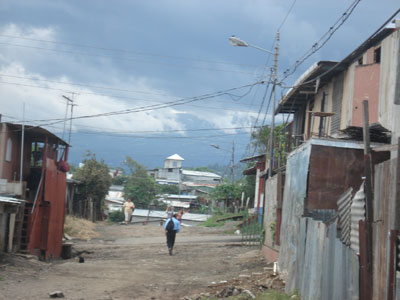The road to La Carpio is a thin causeway, with cliffs on both sides from what appeared to be pit mines. This is a place where there are gravel streets and improvised homes built with whatever materials can be found. Right across the river is the site of San Jose's dump, the only location the government could find that wouldn't create public outcry.

Here, small groups of students were assigned to interview various people in the community about their experience as an immigrant. I can't forget the woman we talked to. Her tragic story exemplified the thesis (which we were examining) that immigration is motivated by a complicated mix of circumstances, with economic factors being only part of the equation.
This woman fled Nicaragua not only to escape poverty, but to escape horrible abuse inflicted upon her by her father. A drunk, he was physically abusive to both his wife and daughters. The woman showed us scars where he had burned her, and broke into tears as she told us that at times, the emotional pain had been so bad that she wanted to die. The situation was made worse by the fact that her mother refused to abandon him, supporting him financially and enabling his alcoholism. Eventually she fled, and left without the support of her family had to make it on her own. She told us how she and a friend had crossed the border through wilderness, running because they thought they were being chased by a tiger. She made her way to San Jose, where she was able to find work cleaning houses, get married and have children. She said she feels lucky now, to be alive and have a means to support her family. For a while she sent remittances to her mother and sisters, but stopped when she learned that the money was still going to her father. Although the physical and emotional scars remain, she is no longer suicidal, something she attributes to God.
No comments:
Post a Comment